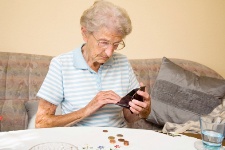 Are people in a low-economic bracket more likely to suffer from cancer? Many studies have found a link between economic status and the risk of illness, and the reasons seem obvious. Low-income people are less likely to visit a doctor when sick, may not have health insurance or the financial means to take care of their illness, have less access to nutritious foods, and are more likely to suffer from certain illnesses. Does that logic stay true for cancer, too?
Are people in a low-economic bracket more likely to suffer from cancer? Many studies have found a link between economic status and the risk of illness, and the reasons seem obvious. Low-income people are less likely to visit a doctor when sick, may not have health insurance or the financial means to take care of their illness, have less access to nutritious foods, and are more likely to suffer from certain illnesses. Does that logic stay true for cancer, too?
According to Harvard health economist Felicia Knaul, most definitely. She says that the poor are more likely to suffer from serious illnesses like cancer, and that’s because of lifestyle factors, like a diet filled with fast food instead of nutritious food and a lack of preventative measures (such as access to screenings or proper medical tests). In fact, Knaul states that the poor are unlikely to get the same amount of morphine for their pain as the average middle-class or upper-class person.
“Cancer is not only a disease increasingly of the poor, it’s a disease in which the poor are suffering even more,” says Knaul, an advocate for equal access to medical care.
The point she likes to make—and the one she discusses in her recent book, Closing the Cancer Divide: An Equity Imperative—is that many illnesses are preventable, but the poor often get stuck in the cracks. Factors like smoking, obesity, and detrimental lifestyle choices hurt the poor, within the U.S., and in poor areas like Latin America and Africa, according to Knaul, and the sad fact is that simple lifestyle changes can prevent these serious illnesses.
PLUS: Counting calories while counting dollars
This divide—between the rich and poor, and their access and the type of treatment they receive—must end, she insists.
“If you take a disease like retinoblastoma [a type of eye cancer], most children in high-income countries will hope for a cure and also live through the disease retaining their sight,” she says. “In developing countries, the majority will not live through the disease and the few that do will lose their sight. These are the divides that truly concern us.”
People in poorer countries usually have delayed diagnosis, less access to treatments, and a lack of knowledge about the disease that can make a difference in their prognosis. For example, 90% of children diagnosed with leukemia will survive in wealthy countries; but that number dwindles to 10% for children living in poor countries.
The divide doesn’t need to exist, Knaul points out, as there are many low-cost treatment options that can be given to low-income families, especially those in developing countries, which she hopes are given more attention in the years to come.
“Investing in prevention in developing countries is much less costly than what we’re losing in terms of productivity and suffering,” says Knaul.
Source(s) for Today’s Article:
“Poor suffer disproportionately from cancer,” Harvard School of Public Health News web site; http://www.hsph.harvard.edu/news/hsph-in-the-news/poor-suffer-disproportionately-from-cancer/, last accessed March 28, 2013.
Weintraub, K., “Highlight cancer divide between rich, poor nations,” The Boston Globe March 18, 2013; http://bostonglobe.com/lifestyle/health-wellness/2013/03/17/harvard-health-economist-felicia-knaul-health-disparities-between-rich-and-poor-countries/0ISpsqNDv9ked8GmzI5kbJ/story.html, last accessed March 28, 2013.
